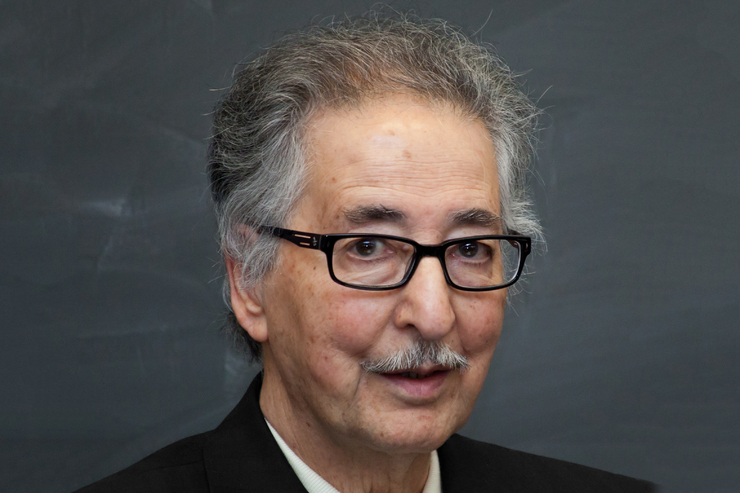October 08, 2021

A bol-Hassan Bani-Sadr, who became Iran’s first president after the 1979 Islamic revolution before fleeing into exile in France, died October 9 aged 88.
He died at the Pitie-Salpetriere Hospital in Paris following a long illness, his wife and children said on Bani-Sadr’s official website.
Bani-Sadr became Iran’s first president in February 1980. But he soon found himself in a power struggle with radical clerics who didn’t like his European-style liberalism. In 17 months he was ousted from office and fled to France, where he spent the rest of his life.
In announcing his death, his family said Bani-Sadr had “defended freedom in the face of new tyranny and oppression in the name of religion.”
In an interview with Reuters in 2019, the former president said Ayatollah Ruhollah Khomeini had betrayed the principles of the revolution after sweeping to power and this had left a “very bitter” taste among some of those who had returned with Khomeini to Tehran in triumph.
Bani-Sadr recalled in that interview how 40 years earlier in Paris, he had been convinced that the religious leader’s Islamic revolution would pave the way for democracy and human rights.
“We were sure that a religious leader was committing himself and that all these principles would happen for the first time in our history,” he said.
In his attempts to form a non-clerical cabinet, Bani-Sadr was also encouraged by a never-fulfilled pledge from Khomeini that the clergy should not assume top posts and instead devote their time to giving guidance and advice to the government.
The power struggle reached a crucial point in March 1981, when Bani-Sadr ordered security forces to arrest religious hardliners trying to disrupt a speech he was giving at Tehran University.
With Khomeini’s consent, parliament impeached and dismissed Bani-Sadr in June 1981, forcing him to go underground. Six weeks later, he secretly flew to Paris with the help of the Mojahedin-e Khalq. There he formed a loosely knit alliance with the group. The alliance collapsed in May 1984 in a clash of ideas between Mojahedin leader Masud Rajavi and Bani-Sadr.
Despite disappointment and his long exile, Bani-Sadr said in the 2019 interview that he did not regret having been part of the revolution.
Bani-Sadr was president when the newborn Islamic Republic went through two of its greatest traumas. Militants stormed the United States embassy in Tehran November 4, 1979. Ten months later, Saddam Hussein’s army invaded Iran, setting off the horrific Iran-Iraq War.
Soon after American diplomats were taken hostage at the US embassy. Bani-Sadr visited the occupiers and urged them to withdraw. “You think you have taken America hostage,” he told them. “What a delusion! In fact, you have made Iran the hostage of the Americans.”
Iran’s ambassador to the United Nations, Mansur Farhang, told The Associated Press in an interview, “In the position of nominal power for a year and a half, he was more of a preacher and teacher than a manager of power. Intellectually and temperamentally, he could not function as a politician in an autocratic state.”
Bani-Sadr was born March 22, 1933, into a family of pious landowners in Hamadan. After studying law, theology and sociology at Tehran University, he moved to Paris, where he spent several years in the 1960s studying at the Sorbonne. He was caught up in the student movement and led protests against the monarchy.
In the 1970s, Bani-Sadr met Ayatollah Khomeini, a friend of his late father, who had also been a cleric. They were reunited in Paris after Ayatollah Khomeini was exiled there in 1978.
In the government that Khomeini installed on his return to Iran, Bani-Sadr served as deputy minister of finance, then minister of finance, and finally as minister of foreign affairs after the US embassy was seized by militants.
In the presidential election of January 25, 1980, with eight candidates running, Bani-Sadr came in first with a remarkable 76 percent of the vote.
In his first weeks in power, Bani-Sadr sought to bring order to the shambles that had been left by the collapse of the Shah’s government, but he was repeatedly distracted by the hostage crisis.
“The takeover of the US embassy was wholly in line with Khomeini’s strategy of focusing hostility abroad,” he later wrote. “It was at this moment that the idea of a religious state became viable. He also realized that he could now silence people at will, by threatening them with the accusation of being pro-American.”
On June 10, 1981, Ayatollah Khomeini removed him from his post as commander in chief of the armed forces. On June 21, the Majlis ruled him “politically incompetent” and voted to oust him as president.
Bani-Sadr is survived by his wife, Azra Hosseini, daughters Firouzeh and Zahra, and son Ali.
